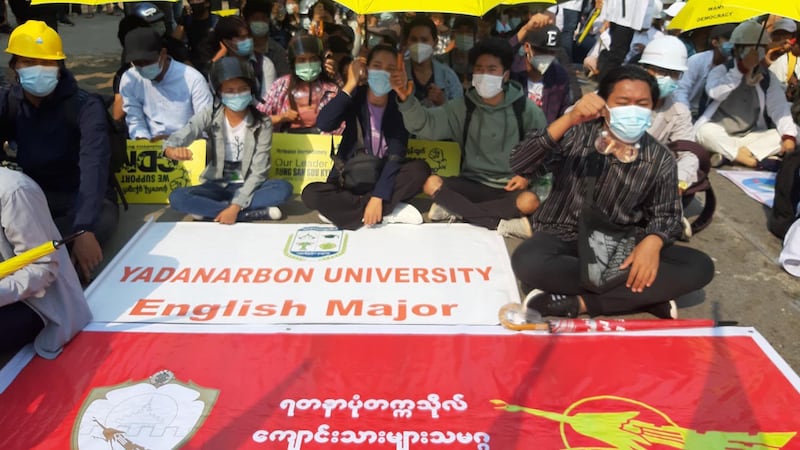Myanmar’s university student population has plummeted by more than 90% since the military’s takeover nearly three years ago, according to statistics published by the junta’s department of education.
Students and instructors interviewed by RFA Burmese, who spoke on condition of anonymity citing security concerns, said the decline in enrollment numbers reflects their choice to boycott the junta’s education system and join the resistance movement.
On Nov. 23, the junta re-opened 47 universities across the country and 24,243 students enrolled for the 2023-24 academic years, according to statistics published by the Department of Higher Education.
But the Department of Basic Education said that 161,850 students took the university entrance exam during the 2022-23 academic year – 109,851 of whom passed.
The numbers from the two departments show that only around 22% of students who passed the entrance exam ended up enrolling at a university.
The rate of enrollment also reflects a staggering drop from that of the year prior to the military’s Feb. 1, 2021, coup.
During the 2019-20 academic year, when the civilian-led National League for Democracy was still in power, 910,229 registered for the university entrance exam, of whom 291,798 passed. Of those who passed, 260,173 enrolled, or nearly 90%.
The numbers show that, under the junta, university enrollment has declined by more than 68%, while the population of university students contracted by more than 90%.
The decline also comes despite junta exhortations for students to attend universities published in state media.
Higher education ‘basically stopped’ under junta
When interviewed by RFA, students and instructors said that they can no longer expect to receive or provide an education that differentiates between right and wrong under the regime, and therefore had decided to suspend their studies.
Others said they could not bring themselves to attend or teach at a university amid widespread suffering in the country and would rather forgo their studies or resign than allow the junta to claim that it had returned enrollment rates to the levels seen prior to the coup d’etat nearly three years ago.
“I feel ashamed to attend university while many families have lost their homes and family members due to the junta,” said one student from the University of East Yangon, who is boycotting classes and has vowed not to return until the military is removed from power.
“As a member of the young generation, I will fight to remove the military dictatorship however I can. So, I decided not to attend university.”
A first year student told RFA that while some students continue to attend university classes, many others have left.
“It is their choice to do so,” the student said.
Meanwhile, an associate university professor who has joined Myanmar’s anti-junta Civil Disobedience Movement, or CDM, boycotting state employment said that the country’s higher education system had essentially ground to a halt under military rule.
“Around 60% of teachers at this level have joined the CDM,” the professor said. “In reality, [the junta] aren’t able to open colleges and universities [due to enrollment declines and boycotting teachers], but they did so anyway.”
The professor acknowledged that “tens of thousands” of students are attending classes at the country’s major universities in cities such as Dagon, Yadanabon, Mawlamyine, Magway and Monywa.
“But the country’s higher education system has basically stopped due to the CDM of university teachers and students since the coup,” they said.
Other sources told RFA that the junta decided to reopen schools despite having so few students enrolled in a bid to show that a sense of normalcy had returned to the country under its watch.
‘Knowledge no longer protected’
An official with the shadow National Unity Government, or NUG, Federal Democratic Education Cooperation Network told RFA that a genuine education is “impossible” in Myanmar while a military regime that routinely persecutes its opponents is in charge.
“Knowledge is no longer protected under the regime,” the official said. “We expect an education system that differentiates between good and evil, but this is no longer possible. We can’t expect such an education amid an environment filled with injustice and corruption.”

In the meantime, the NUG’s Ministry of Education has launched several online programs to support an interim education for CDM students who have boycotted their schools since the coup.
An official from the ministry told RFA that students who are unable to take advantage of the interim education programs due to security concerns will be given a chance to enroll in universities in the country’s post-revolution period.
“[They] will be allowed to join their original university, while assistance will be provided for those who are unable to rejoin their original universities to attend public online universities and other classes,” the official said.
Attempts by RFA to contact the junta’s Department of Higher Education for comment on the state of the country’s university enrollment went unanswered.
Translated by Aung Naing. Edited by Joshua Lipes and Malcolm Foster.
